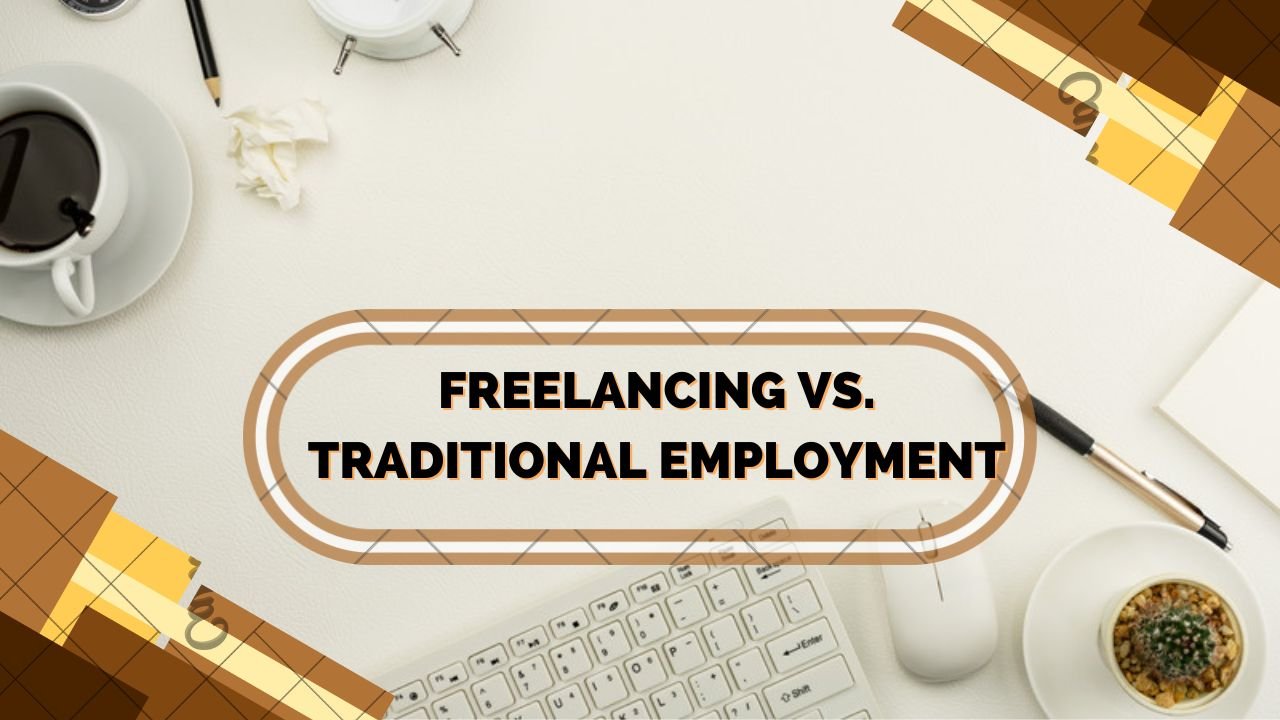Freelancing vs. Traditional Employment: Which is Right for You?

The world of work is changing rapidly. More and more people are opting for freelancing as a way to earn money, pursue their passions and enjoy more flexibility and freedom. According to a report by Upwork, 36% of the U.S. workforce freelanced in 2020, contributing $1.2 trillion to the economy.
But freelancing is not for everyone. Some people prefer the stability, security and benefits of traditional employment. They value having a steady income, a clear career path and a supportive work environment.
So how do you decide which option is right for you? What are the pros and cons of freelancing vs. traditional employment? In this blog post, we will compare and contrast these two modes of work and help you make an informed choice.
What is freelancing?
Freelancing is a form of self-employment where you offer your skills and services to multiple clients on a project-by-project basis. You are not bound by an employment contract or a fixed schedule. You have the freedom to choose your own projects, rates and working hours.
Some examples of freelance services are:
- Writing: blog posts, articles, web copy, newsletters, ebooks, etc.
- Design: logos, graphics, websites, flyers, brochures, etc.
- Development: web development, mobile development, software development, etc.
- Marketing: social media marketing, email marketing, SEO, PPC, etc.
- Consulting: business consulting, coaching, mentoring, etc.
What is traditional employment?
Traditional employment is a form of work where you are hired by an employer to perform a specific role or function within an organization. You are bound by an employment contract and a fixed schedule. You receive a regular salary and benefits such as health insurance, retirement savings and paid time off.
Some examples of traditional employment are:
- Accounting: bookkeeping, auditing, tax preparation, etc.
- Education: teaching, tutoring, curriculum development, etc.
- Engineering: civil engineering, mechanical engineering, electrical engineering, etc.
- Healthcare: nursing, pharmacy, dentistry, etc.
- Law: legal advice, representation, research, etc.
Pros and cons of freelancing
Freelancing has many advantages and disadvantages depending on your personal preferences and goals. Here are some of the main pros and cons of freelancing:
Pros of freelancing
- Flexibility: One of the most significant advantages of freelancing is the flexibility it provides. Freelancers have the ability to work from home or any location with an internet connection and can often set their own schedules. This makes it easier to balance work with other obligations such as family, education or personal pursuits.
- Independence: Freelancers have more control over their work and can choose the projects they take on. They have the freedom to pursue their passions and specialize in a particular niche which can lead to more fulfilling work and a stronger professional network.
- Potential for higher income: Freelancers often have the potential to earn more money than traditional employees especially if they have a unique skill set or are in high demand. Additionally freelancers can set their own rates and negotiate their pay which can lead to higher earnings over time.
Cons of freelancing
- Lack of stability: Freelancers do not have the same level of job security as traditional employees. They are not guaranteed a steady stream of work and may experience fluctuations in income. Additionally they are responsible for their own benefits and may not have access to the same level of healthcare retirement savings or other perks that traditional employees receive.
- Administrative tasks: Freelancers are responsible for managing their own finances taxes and contracts. This can be time-consuming and may require hiring additional help or outsourcing tasks which can eat into profits.
Pros and cons of traditional employment
Traditional employment also has many advantages and disadvantages depending on your personal preferences and goals. Here are some of the main pros and cons of traditional employment:
Pros of traditional employment
- Stability: Traditional employees typically have more job security than freelancers as they are guaranteed a set number of hours and a regular paycheck. Additionally they often have access to benefits such as healthcare retirement savings plans and paid time off.
- Professional development: Traditional employees may have access to more opportunities for professional development and advancement within their company. This can lead to a stronger resume and higher earnings potential in the future.
Cons of traditional employment
- Less autonomy: Traditional employees are typically subject to more direct control and supervision from their employer. They may have less freedom to pursue their passions or set their own schedules which can lead to burnout or dissatisfaction.
- Lower potential for income: Traditional employees often have less earning potential than freelancers especially if they are in an oversaturated field or lack specialized skills.
Conclusion
Freelancing and traditional employment are two different modes of work that offer different benefits and drawbacks. There is no one-size-fits-all answer to which option is right for you. It depends on your personal preferences, goals, skills and situation.
To decide which option is right for you, you need to consider:
- What are your skills and interests?
- What are your income and lifestyle goals?
- How much flexibility and autonomy do you need?
- How much stability and security do you value?
- How do you cope with uncertainty and risk?
By weighing the pros and cons of freelancing vs. traditional employment, you can make an informed choice that suits your needs and aspirations.
Freelance Illustration: Finding Your Niche and Target Market
